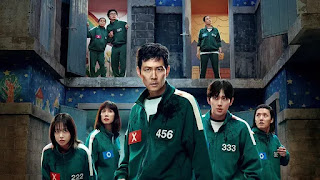Squid Game wraps its saga with Season 3, launched on June 27, 2025 via Netflix . This six‑episode final arc has Seong Gi‑hun re‑entering the games—not to win, but to dismantle the brutal system from within .With more intimate character focus and harsher visuals, it swings deeper into morality and trauma than the previous seasons. Unlike Season 1’s fresh trauma and Season 2’s sprawling setup, Season 3 is tight and propelled by broken souls. Opening immediately after Gi‑hun’s failed rebellion, the story prioritises emotional payoff over novelty .
Parallel threads—North Korean defector No‑eul infiltrating as a guard, and Detective Jun‑ho seeking the island—complement the main arc. They add tension but occasionally feel underdeveloped. The plot centers on moral dilemmas: showing everyday people pushed to brutality. While critics applaud the renewed pace and focus, some lament that the narrative feels overstuffed and emotionally manipulative, especially around the baby subplot and VIPs’ caricatured presence.
Lee Jung‑jae’s portrayal of Gi‑hun anchors everything—his near‑mute opening scenes feel like watching a collapse in slow motion . He remains the emotional heart.
Supporting standout performances include:
Jun‑hee (Jo Yu‑ri) – a pregnant contestant whose risk-taking embodies the show’s moral core.Geum‑ja (Kang Ae‑sim) – the grandmother whose heartbreaking choices amplify moral tension.
Myung‑gi (Im Si‑wan) and Hyun‑ju (Park Sung‑hoon) bring nuance to desperation under duress.
Lee Byung‑hun returns as the enigmatic Front Man, delivering intensity, though his time is limited.
Wi Ha‑joon (Jun‑ho) is compelling, yet critics note his arc lacks payoff.
Overall, the cast shines—though some arcs, particularly VIPs, feel hollow .
Season 3 heightens its signature visual dichotomy: childhood motifs shattered by visceral horror. The hide‑and‑seek set is described as “an MC Escher fever dream,” merging bright whimsy with dread. The “jump‑rope bridge” sequence echoes Season 1’s tension but intensifies the stakes. Cinematographer Chae Kyoung‑sun constructs spaces that feel surreal yet suffocating, accompanied by Jung Jae‑il’s haunting musical score . Production quality remains top‑tier, but critics caution that the growing spectacle highlights pacing imbalances and emotional dissonance in some episodes
At its core, Season 3 probes darker ethical territory. Games are no longer about outwitting others—they force participants to choose between compassion and survival. The baby subplot, for instance, is seen as both a metaphor for generational trauma and emotionally overwrought .
Critics praise how it navigates complicity and agency, exploring whether Ky‑hun remains fundamentally good or consumed by violence . The VIP scenes, intended as capitalist critique, are frequently called “cartoonish” and “hammy”; they detract from the show’s emotional gravity .
Some find the finale disappointingly ambivalent—too bleak for catharsis and insufficiently conclusive . Others appreciate its cynical realism, mirroring a world where systemic power resists dismantling.
Social media protests reflect deep divide: praise for its brutal emotional resonance vs. fatigue from repetitive violence . One fan tweet summed up the split well:
“This season doesn’t want you entertained. It wants you disturbed.”
For many viewers, that unapologetic ambition is precisely what sets Season 3 apart.
Strengths & Weaknesses
Immersive psychological tension – Hide‑and‑seek remains one of the best psychological set‑pieces yet .Emotional depth – Gi‑hun’s final act—sacrificing himself to save Jun‑hee’s baby—is a poignant culmination of his moral arc.
Character-driven drama – Performances add gravitas and moral ambiguity, with standout arcs from Jun‑hee, Geum‑ja, and Hyun‑ju.
Strong production – Visual and auditory design continue a legacy of striking artwork and atmosphere .
Underused storylines – Jun‑ho’s detective arc and VIP subplot feel underdeveloped or tonally at odds.
Pacing issues – Episodes risk feeling stretched before rushing to resolve intense drama
Ambiguous ending – The finale’s bleak, unresolved tone may frustrate those hoping for closure.
Squid Game Season 3 is an emotionally visceral and morally unflinching finale—one that refuses to reassure you. It eschews spectacle in favor of personal sacrifice, relentless ethical testing, and uncomfortably true brutality. Viewers seeking narrative clarity, or straightforward metaphor, may feel frustrated—but those looking for a show that interrogates its own brutality will find much to unpack.
On Rotten Tomatoes, it holds 83 % positive reviews, with a Metacritic score of 66/100, reflecting generally favorable—but divided—opinions
If you believe the hallmark of Squid Game was its willingness to disturb and provoke, Season 3 delivers with dark ambition.
If you hoped for emotional catharsis or thematic resolution, this finale may feel bleakly open-ended.
Either way, Season 3 stands as a bold, flawed, and memorable conclusion to one of Netflix’s defining franchises. Bracingly bold and unsettling—Season 3 doubles down on its moral purity and stylistic nightmares. It’s compassionate chaos, not comfort. Whether hailed as the poignant end or critiqued as narrative overreach, it cements Squid Game as a show unwilling to soft‑sell its brutal truths.

Comments
Post a Comment